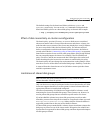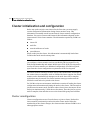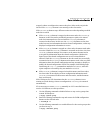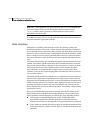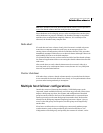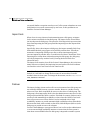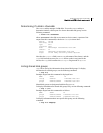
417Administering cluster functionality
Multiple host failover configurations
Note: Once shutdown succeeds, the node has left the cluster. It is not possible to
access the shared volumes until the node joins the cluster again.
Since shutdown can be a lengthy process, other reconfiguration can take place
while shutdown is in progress. Normally, the shutdown attempt is suspended
until the other reconfiguration completes. However, if it is already too far
advanced, the shutdown may complete first.
Node abort
If a node does not leave a cluster cleanly, this is because it crashed or because
some cluster component made the node leave on an emergency basis. The
ensuing cluster reconfiguration calls the VxVM abort function. This procedure
immediately attempts to halt all access to shared volumes, although it does wait
until pending I/O from or to the disk completes.
I/O operations that have not yet been started are failed, and the shared volumes
are removed. Applications that were accessing the shared volumes therefore fail
with errors.
After a node abort or crash, shared volumes must be recovered, either by a
surviving node or by a subsequent cluster restart, because it is very likely that
there are unsynchronized mirrors.
Cluster shutdown
If all nodes leave a cluster, shared volumes must be recovered when the cluster
is next started if the last node did not leave cleanly, or if resynchronization from
previous nodes leaving uncleanly is incomplete.
Multiple host failover configurations
Outside the context of clustering functionality, VxVM disk groups can be
“imported” (made available) from only one host at any given time. When a host
imports a disk group as private, the volumes and configuration of that disk
group become accessible to the host. If the administrator or system software
wants to privately use the same disk group from another host, the host that
already has the disk group imported (importing host) must “deport” (give up
access to) the disk group. Once deported, the disk group can be imported by
another host.
If two hosts are allowed to access a disk group concurrently without proper
synchronization, such as that provided by the Oracle Parallel Server, the
configuration of the disk group, and possibly the contents of volumes, can be



